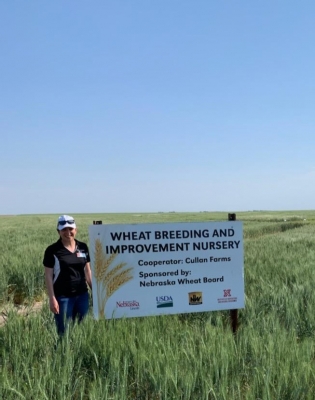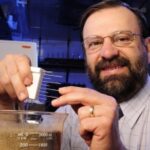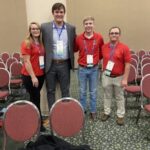
In March of 2021, a decade of hard work and persistence paid off as Katherine Frels moved back to Lincoln and into the field, not as a graduate student but as the first female small grains breeder in University of Nebraska history.
Agronomy alum, Katherine grew up in Guthrie Center, Iowa where her parents are the local veterinarians. One generation off the farm, she was surrounded by agriculture but never took an ag class in high school. Her interest was science. A class in biotechnology showed Katherine the scientific possibilities of a career in agriculture.
“We learned how the GMO process works,” Katherine said. “I saw all the work and genetics that went into the corn and soybeans I drove past every day. I realized that ag science was fascinating.”
Katherine’s college search was largely centered on land-grant intuitions in the Midwest. Her college visit at ISU focused on biology. Something was missing in her visit until she met Dr. Russ Mullen, professor in agronomy. She shared her passion for plants, caring for the environment and helping rural communities.
“Dr. Mullen said ‘if that’s what you want to do, you come here and major in agronomy,’” Katherine said. “He was right.”
Katherine joined Agronomy Club at Iowa State which she attributes to kickstarting her success as a scientist. Through the club, she attended the agronomic scientific meetings as an undergrad in SASES. It was something she may not have done on her own but networking at those meetings started spinning the web of her successful career.
Katherine toured various breeding companies in classes, eventually getting an internship with AgReliant Genetics through the College of Agriculture and Life Sciences Career Fair.
“That internship really showed me what it meant to be a plant breeder,” Katherine said. “I found that the common factor in the jobs I was most interested in was that they all were Ph.D. level.”
As graduation approached, Katherine’s hope to feed people had her focused on small grains. The public breeding programs in small grains would also allow her to see the process from beginning to end. She applied to four schools with strong small grains programs.
“I chose UNL due to the diversity and engagement of the students on the project,” said Katherine. “The project available really combined my interest in breeding and reducing the impact of farming on the environment.”
In 2011, Katherine moved to Nebraska to work as a Ph.D. candidate for Dr. P. Steven Baenziger and found herself on the cutting edge of high throughput phenotyping looking at improving nitrogen efficiency in winter wheat.
 “I spent hours hauling heavy backpacks around fields,” Katherine said. “Now we can do the same thing with drones in a fraction of the time.”
“I spent hours hauling heavy backpacks around fields,” Katherine said. “Now we can do the same thing with drones in a fraction of the time.”
After finishing her Ph.D. work in 2015, Katherine joined the University of Minnesota’s Forever Green Initiative working to develop continual green cover across the state. She worked to domesticate field pennycress with Dr. Jim Anderson.
“Leveraging next generation sequencing and high throughput phenotyping and tools to apply that to a new domestication process was an incredible experience,” said Katherine.
Her interest has always been to leverage plant breeding in a way that advances conservation to help the environment while being economically viable for farmers. Sitting in the driver’s seat of her own breeding program, Katherine wants to fill a farmer’s toolbox with plenty of breeding options to choose from for their unique operation.
“Steve built a tremendous program,” said Katherine. “I can’t do what he did, but he taught me to not to limit my thinking. As plant breeders, we will always look at yield and disease but that is only the beginning.”
Her predecessor agrees.
“She is a former graduate student of the project, knows Nebraska well, and will take the program to new heights,” Baenziger said. “The future is very bright.”





